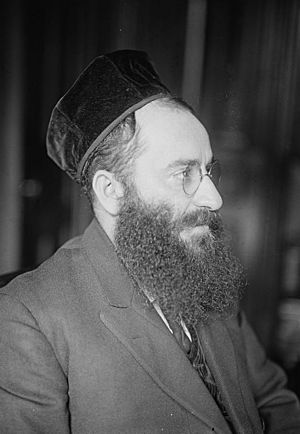Yossele Rosenblatt facts for kids
Quick facts for kids
Josef "Yossele" Rosenblatt
|
|
|---|---|

Rosenblatt in 1918
|
|
| Background information | |
| Born | May 9, 1882 Bila Tserkva, Ukraine |
| Died | June 19, 1933 (aged 51) Jerusalem, Mandatory Palestine |
| Genres | Jewish music |
| Occupations | Cantor, hazzan, singer, composer, Conductor, actor |
| Years active | 1886–1933 |
Josef "Yossele" Rosenblatt (May 9, 1882 – June 19, 1933) was a famous Ukrainian-born cantor and composer. Many people thought he was the best cantor of his time.
Contents
Early Life and Career
Yossele Rosenblatt was born on May 9, 1882. His birthplace was Bila Tserkva, which was part of the Russian Empire. He came from a family of cantors. Because he grew up in a very religious home, he did not go to formal music schools.
He started singing in his local synagogue choir. People quickly saw he was a "wunderkind," or child prodigy. This means he was very talented at a young age. His solo singing career began when he was still a child. At age 7, his family moved to Sadigora, in Austria.
When he was 17, Rosenblatt spent several months in Vienna. He sang in the city's largest synagogues. He also learned from Jacob Maerz, a skilled singer and musician. After Vienna, he toured many communities in the Austro-Hungarian empire. This included the city of Budapest.
At 18, he married Taube Kaufman. He then took his first full-time job in Munkacs, Hungary. In 1901, he moved to Pressburg (Bratislava). Five years later, he worked in Hamburg, Germany.
Moving to America
In 1912, Rosenblatt moved to Harlem in New York. He became the cantor at the Ohab Zedek synagogue. He left this job in August 1927.
During the High Holy Days that year, he led services in Chicago. On Sukkot, he sang in Detroit. For many months, he traveled across the United States. He led services in cities like Minneapolis and Philadelphia. In Washington, D.C., he even met with President Calvin Coolidge.
In 1928, he signed a 10-year contract. This was with the First Congregation Anshe Sfard in Borough Park, Brooklyn.
Rosenblatt became famous beyond the Jewish community. He earned a lot of money from concerts. He also sang in the 1927 movie The Jazz Singer. People even called him "The Jewish Caruso" because he was so good.
Financial Challenges
In the early 1920s, Rosenblatt faced money problems. He joined two men who wanted to start a new Jewish newspaper. He thought it would make him rich and give him financial freedom.
However, the newspaper did not do well. Rosenblatt had to use his savings and income to pay debts. In January 1925, he had to file for bankruptcy. This meant he was legally free from most of his debts. But he promised to pay them back anyway.
Journey to Israel and Passing
Later, Rosenblatt was offered a chance to make a film. This film would be made in Mandatory Palestine. The payment depended on the film's success. But he decided to take the chance. It would help him get away from his debts. It also allowed him to visit Palestine, a place he had never seen.
He traveled to Palestine with his wife and two youngest children. Some of his older children were grown up. They took care of their younger siblings. Rosenblatt decided he would stay in Palestine.
He died from a heart attack on June 19, 1933. He was 51 years old. He passed away in Jerusalem.
Singing Style
Rosenblatt was known for his amazing singing skills. His voice was very sweet. He could also switch from a normal voice to a falsetto (a very high voice) smoothly.
His singing technique was special. He could hit notes very accurately and quickly. He also sang Fiorituras, which are fancy musical patterns, almost perfectly.
His fame spread far and wide. The famous conductor Toscanini asked him to sing in an opera. But Rosenblatt said no. He believed he should only use his voice to honor God. He even turned down a big offer from the Chicago opera house. This was because it went against his religious beliefs.
Rosenblatt wrote to many great singers of his time. It is said that when Enrico Caruso heard Rosenblatt sing "Elli Elli," he was so moved that he went on stage and kissed him.
Legacy
Rosenblatt greatly influenced cantorial music's "Golden Age." He helped change the style of cantorial music. Before him, it was more free-flowing. He made it more structured and rhythmic.
He also created new singing techniques. Cantors around the world later adopted these. One was his special krekhts, or sob. He would let his voice crack on purpose. This helped show the emotion of the song. He also developed a realistic soprano falsetto. This helped ease the strain on his voice. He wrote many songs, and over 180 of them have been saved.
Rosenblatt's great-grandsons are also important religious leaders. They include Rabbi Dr. Jonathan Rosenblatt and Rabbi Andrew Rosenblatt.
His recordings have been re-released many times. These include old 78 RPM records, LPs, and CDs. Recently, a set of 3 CDs called Od Yosef Chai came out. It has restored versions of his old recordings.
Rosenblatt's music was also featured in the 2009 movie A Serious Man.
 | Percy Lavon Julian |
 | Katherine Johnson |
 | George Washington Carver |
 | Annie Easley |

